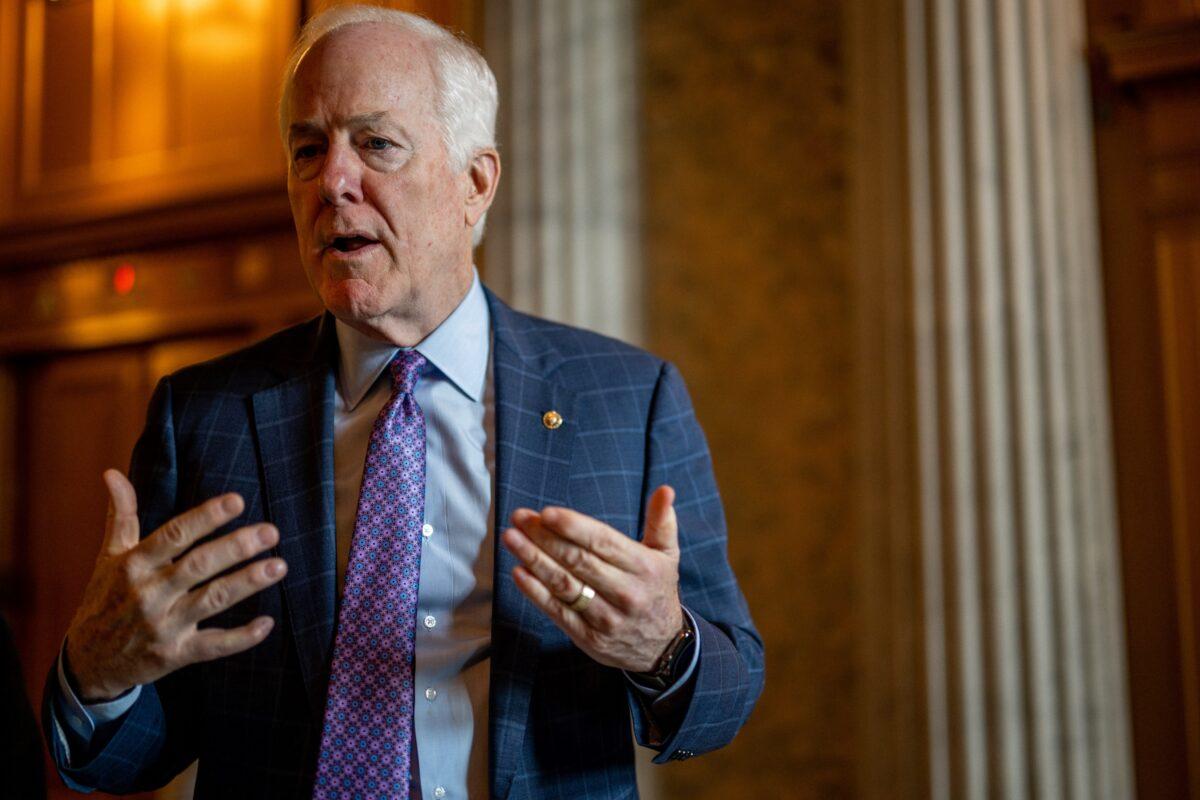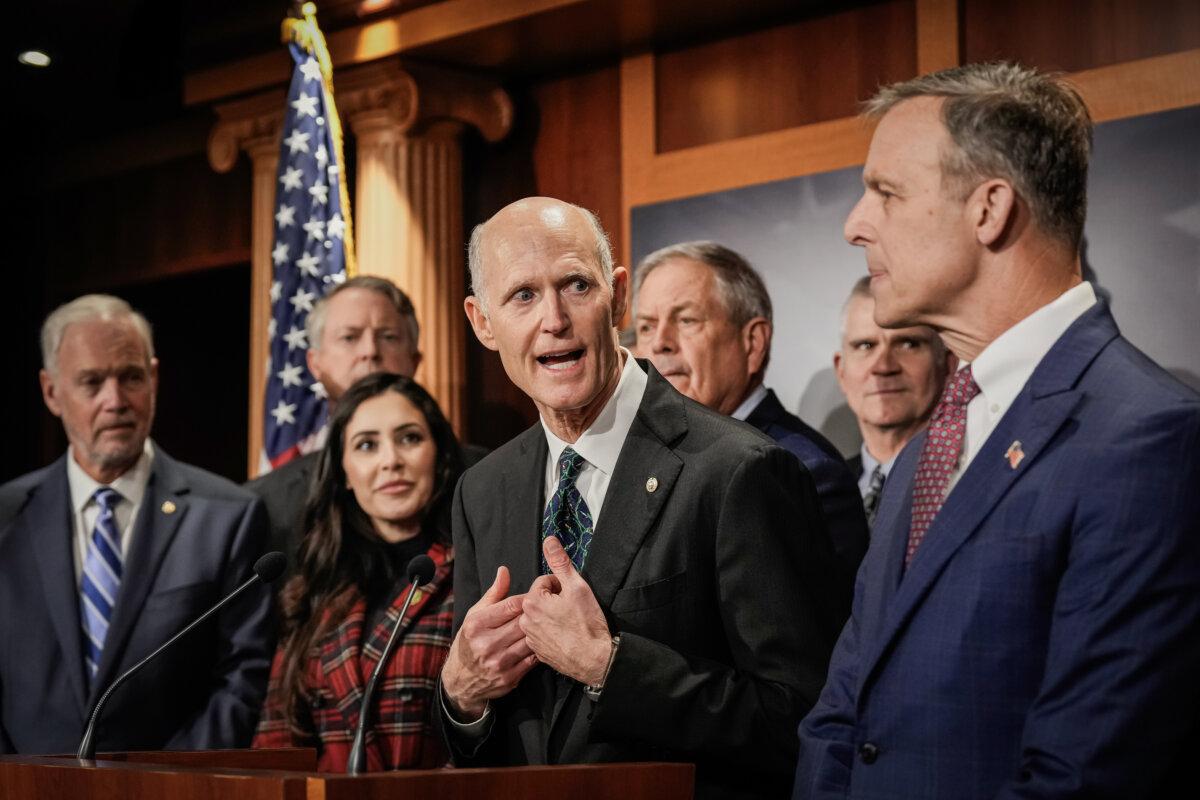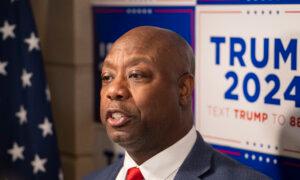Who is chosen to head the Senate Republican Conference for 2025 could be as important a decision as who is elected president.
Sen. John Thune (R-S.D.) has the inside track to succeed Sen. Mitch McConnell (R-Ky.) as Senate Republican leader, but that could change as support grows among notoriously independent GOP senators for term limits and related reforms in how their conference is led.
Mr. Thune has two announced rivals, Sen. John Cornyn (R-Texas), a former Senate Majority Whip under Mr. McConnell, and Sen. Rick Scott (R-Fla.), who challenged and lost to the Kentucky Republican in 2022.
Sen. Steve Daines (R-Mt.), Chairman of the Senate Republican Campaign Committee (SRCC), is a potential unannounced fourth contestant, but his prospects depend primarily upon how well GOP senate candidates do in the November election. If the GOP regains the Senate majority with a net pickup of four or more seats, Mr. Daines may well enter the race.
Mr. Thune enjoys the advantages of incumbency, having served as second-in-command to Mr. McConnell for more than four years, and the unofficial but hugely significant backing of the McConnell machine.
A former basketball player, Mr. Thune’s mild-mannered public persona and generally conservative voting record in the Senate since 2005 has enabled him to stay out of the kind policy and personality tempests that can complicate consensus building.
He gained his Senate seat by defeating then-Senate Majority Leader Tom Daschle in 2004.
Mr. Cornyn represents a middle ground between preserving the establishment Republican wing of the GOP represented by Mr. McConnell and Mr. Thune and encouraging the more free-wheeling, populist approach favored by Mr. Scott and a powerful bloc of conservative colleagues such as Sen. Mike Lee (R-Utah), the chairman of the Senate Republican Steering Committee.
The clash of philosophies shaping the behind-the-scenes battle to succeed Mr. McConnell prompted a recent exchange of colleague letters, with the first on June 23 from Sen. Thom Tillis (R-N.C.) representing the status quo wing of Senate GOPers, and the second in the June 26 response by Mr. Lee.
Mr. Tillis was held up by the Senate Democratic Conference, led by Senate Majority Leader Chuck Schumer (D-N.Y.), as a model GOP senators should consult.
The Democrats have no term limits for their conference leadership positions, the North Carolina Republican pointed out, and Senate Democrats display remarkable unity behind Mr. Schumer’s policy, procedural, and scheduling decisions.
And, like Mr. McConnell and multiple majority leaders from both parties before him, Mr. Schumer also oversees a parallel candidate recruitment and fundraising process that came to prominence during the tenure of Senate Majority Leader Harry Reid (D-Nev.) from 2007 to 2015.
Besides controlling the Senate’s floor schedule, that system gives the Senate party leader the deciding say on which committees individual senators serve on, which senators get millions of additional campaign dollars for their reelection drives, and even how many amendments individual senators can offer on the Senate floor.
This ubiquitous power is more or less evident in every corner of the Senate.

According to Mr. Tillis, “weakening the leader would be counter-productive,” and “having terms limits on the leader could make the political side of the job more difficult.”
But, just as similar controls by the House leadership have incited rebellions spearheaded by members of the House Freedom Caucus, Mr. Scott, Mr. Lee, and other senatorial advocates for term limits are pushing reforms that don’t jibe with the priorities of the party’s establishment wing.
While agreeing with Mr. Tillis on some key points—most notably, limiting the power of the Senate leader to “fill the amendment tree” when legislation comes to the Senate floor—Mr. Lee drew a sharp line of distinction on the term limits issue.
In his letter, the Utah Republican described term limiting the Senate leader as “a long-overdue reform that would allow future talent to rise within the Republican conference, thereby ensuring that the conference gets the best of new ideas, creative approaches to leadership, temperament, and talent.”

The absence of term limits, Mr. Lee continued, discourages challenges to the Senate leader “who could easily remain in power for the rest of their time in the Senate, exercising significant control over their committee assignments, fundraising, etc.”
The secret ballot vote to choose new leadership will be held in a closed-door Senate Republican Conference meeting sometime after the Nov. 5 election.
Mr. McConnell is the longest-serving Senate party leader in American history.
Mr. Thune has been his top deputy since 2019, serving as Senate Majority Whip in the 116th Congress and as Senate Minority Whip in both the 117th and 118th Congress.
The Kentucky Republican is officially stepping down as Senate minority leader, but, barring unexpected health problems, he will remain a powerful behind-the-scenes factor shaping how the upper chamber GOP functions in the 119th Congress.
Mr. McConnell plans, for example, to continue attending meetings of the GOP leadership next year, and he will also continue to have a major impact by virtue of his close relationship with many of the key donors to Republican Senate campaigns via the Senate Leadership Fund (SLF).
The SLF, which is an independent Super PAC founded by longtime backers of Mr. McConnell in 2015, spent nearly $250 million on Republican Senate candidates in 2022 and is expected to exceed that total in 2024.
Even Mr. McConnell’s critics acknowledge his political achievements, most notably in refusing as Senate Majority Leader to convene Senate confirmation hearings when President Barack Obama nominated federal judge Merrick Garland for the U.S. Supreme Court in 2016.
Mr. Scott lost decisively when he challenged Mr. McConnell in 2022 following the GOP’s failure to enjoy a triumphant “Red Wave” in the congressional elections that year.
Despite that loss, the Floridian was the first to announce his candidacy this time around.
“I believe that our voters want us to use this leadership election to make a choice to upend the status quo in Washington.”

Senate Republicans must open up the conference and be more transparent, Mr. Scott wrote, explaining that “we need to be way more transparent with each other and the American people.
“There have been far too many backroom deals cut in secret, rarely do things go through the committee process, and it’s accepted practice to not allow amendment votes to trillion-dollar spending bills.”
The challenge facing Mr. Scott is that his colleague from Texas is widely thought to be more likely to garner support from both the populist conservative Steering Committee senators and a significant portion of the more centrist Republicans who would otherwise line up behind the South Dakotan.
Mr. Cornyn is viewed as the most likely compromise candidate because he was a loyal McConnell follower while serving as Senate majority whip from 2015 to 2019, but he’s also a long-time member of the Steering Committee.
That is why his March 5 social media post saying he would back the term limits proposal is viewed as an opening bid for such a compromise coalition.
The term-limits post went out shortly after the Texas lawmaker met with multiple members of the Steering Committee, who back the proposal, according to another senior Republican Senate aide who asked not to be named.
The aide attributes Mr. Cornyn’s term limits enthusiasm to his need to rebuild his conservative credentials.
That aide agreed that if Mr. Scott dropped his candidacy, Mr. Cornyn would be the strongest candidate against Mr. Thune.
“I think a deal has to happen—a deal of that nature has to happen at some point—but whether it’s in October, November, the night before, or in the room the day of the conference vote, I think that’s essentially where this ends up,” the aide explained.
Whether such a deal would be enough to put Mr. Cornyn over the top could end up depending on the wild card, Mr. Daines.
There are 49 Republicans in the Senate, and most observers expect them to gain at least two more seats in November to regain the majority.
But if Republicans gain significantly more seats, perhaps even as many as five, such success could thrust Mr. Daines into a strongly independent position.
And the Montanan may have an inside advantage should former President Donald Trump be re-elected to the White House.
“The best-case scenario for Daines is Trump wins, we take back the Senate majority, and [Daines] grows it by three to five seats. Daines has done a lot of legwork with Trump, and particularly with Don Jr.,” said another senior GOP aide who spoke on condition of anonymity.
Mr. Daines and the former president’s oldest son talk often and share a passion for hunting.
“He definitely could have the insider track if he delivers a solid Republican majority and has Trump’s backing,” the aide added.
Original News Source Link – Epoch Times
Running For Office? Conservative Campaign Consulting – Election Day Strategies!


